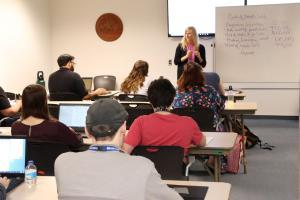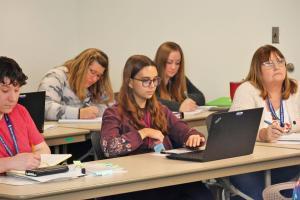Customizing education for today's workforce
Every Monday and Wednesday at 2 p.m., Tim VonDeBur logs off his work computer at the Illinois Department of Revenue (DOR) and walks down the hall into his Accounting 103 class, without ever leaving the Willard Ice Building.

“I haven’t been to school in 25 years, so the first quiz was really nerve-wracking and so was the first exam, but I’ve done pretty well,” he explains.
The class is the first in a series of five courses designed to give current DOR employees the knowledge necessary to move into the auditor training program, which opens the door to advancement and a higher earning potential.
DOR employees have been taking the same classes on the LLCC campus for 20 years and receiving tuition reimbursement from the state. This year, the DOR and LLCC partnered to offer the courses onsite during the workday, hoping to encourage more employees to participate and hopefully qualify to fill these much-needed auditor positions.
Accounting Professor Katie Tice teaches the courses at the Willard Ice Building. “It’s great to be able to reach more students. There might have been Department of Revenue employees who would have thought about taking these classes but could not make the commitment outside of work hours.”
VonDeBur says he’d considered taking the classes during his 15 years at the DOR but found it difficult to carve time out of his personal evening schedule for the classes. “When they offered to pay me to take the classes here and gave me time to do it, that made it a lot more appealing.”
“To speed up that pipeline for the Department of Revenue, we’re bringing the training to their location during work hours to try to make it expedient and accessible for their staff,” says Dr. Laurel Bretz, assistant vice president of continuing, corporate and professional education.
A business partner
DOR is just one example of how LLCC is customizing education for the workforce. Over the past year, LLCC has partnered with a variety of private and public employers across many industries including health care, manufacturing, agricultural, food service, information technology and municipal and state government.
Trainings and programs have included leadership development; aerial lift and OSHA safety; EPA certification; Microsoft Excel, Outlook and Word; AutoCAD; clinical medical assistant; and accounting.
LLCC’s pilot program of 17 brand new Department of Innovation and Technology (DoIT) trainees just wrapped up their first of three sets of courses preparing them to fill in-demand helpdesk positions within the state.
“The benefit to those trainees is that they will be immediately employed,” explains Dr. Carmen Allen, LLCC professor of computer science. “They are on the job, learning what they need to know, and when they finish, they’ll have a guaranteed job.”

With the competitive labor market and staff shortages, employers are looking for alternative strategies to find and retain skilled employees. A model some have adopted is to partner with LLCC to provide relevant skills training for new hires as part of their employee onboarding. “Organizations either promote from within or hire from the outside, and then work with us to provide skills training to upskill or reskill staff for the jobs,” says Dr. Bretz. “It is a ‘grow your own’ model rather than expecting new hires to walk in the door knowing everything.”
Custom business solutions
The first step in customized education is sitting down with a business or organization for a needs assessment. “We find out what the organization is struggling with, identify what success would look like and then match current programming or customize our offerings to meet employers where they are,” Bretz says.
Some clients require credit-bearing courses, like accounting or computer science, while others’ needs are non-credit courses designed around a specific skillset like leadership or heavy equipment safety training. “During an initial meeting with a client, we’ll talk about scope, timeline, logistics and educational outcomes and from there provide innovative and tailored solutions that align with an organization’s talent development needs.”
